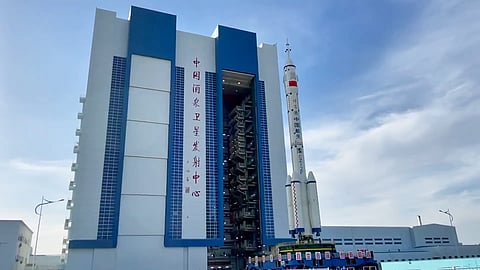

China successfully launched an upgraded version of its methane-powered Zhuque-2 rocket on Saturday, as part of an ongoing effort to develop reusable launch vehicles and advance its private space sector.
The Zhuque-2E Y2, designed by Beijing-based private company LandSpace Technology, lifted off from the Jiuquan Satellite Launch Center in northwest China in the early afternoon. The mission carried six satellites into orbit—an increase in payload capacity compared to previous launches.
This marks the fifth launch in the Zhuque-2 rocket series and continues China's pursuit of methane-liquid oxygen engines, which are seen as more environmentally friendly and cost-effective than traditional hydrocarbon-based fuels. These characteristics also make them a promising candidate for reusable rockets, a critical innovation in lowering the long-term cost of spaceflight.
LandSpace made headlines in July 2023, when it became the first company in the world to successfully launch a methane-powered rocket into orbit, narrowly beating U.S. competitor SpaceX, which had been developing a similar capability.
The satellites deployed during Saturday’s launch were built by the Changsha Tianyi Space Science and Technology Research Institute, also known as Spacety. According to Spacety Vice President Li Xiaoming, the payload included one radar satellite, two multispectral imaging satellites, and three satellites for scientific experimentation.
Spacety was sanctioned by the U.S. Treasury Department in January 2023, accused of supplying satellite imagery of Ukraine to a Russian company—allegations the company has denied.
Reusable launch systems have become the new frontier of spaceflight economics, with companies and governments around the world racing to lower costs through recovery and refurbishment of launch hardware. LandSpace CEO Zhang Changwu stated the company has already begun work on a fully reusable rocket, with testing expected to begin in the second half of 2025.
Founded in 2015, LandSpace has positioned itself as China’s answer to SpaceX, both in its rocket technology and its ambitions. In addition to its launch program, the company is also working on creating a constellation of satellites to rival Elon Musk’s Starlink, aiming to provide global internet coverage.
The Zhuque-2E Y2 mission underscores how China’s private aerospace sector—enabled by regulatory reforms in 2014 allowing private investment—is increasingly becoming a serious player in the global space industry.